SPARTA, Ga. — When the deputy sheriff’s patrol cruiser pulled up beside him as he walked down Broad Street at sunset last August, Martee Flournoy, a 32-year-old black man, was both confused and rattled. He had reason: In this corner of rural Georgia, African-Americans are arrested at a rate far higher than that of whites.
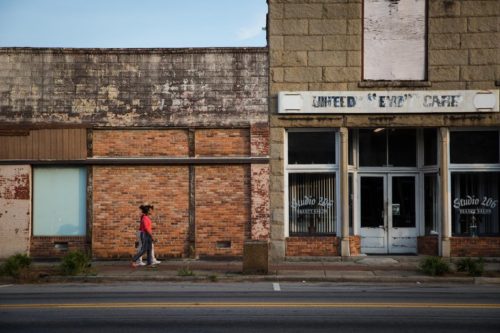
Downtown Sparta, about 100 miles southeast of Atlanta. The Board of Elections and Registration that oversees Sparta systematically questioned the registrations of more than 180 of its black citizens. Credit Kevin D. Liles for The New York Times
But the deputy had not come to arrest Mr. Flournoy. Rather, he had come to challenge Mr. Flournoy’s right to vote.
The majority-white Hancock County Board of Elections and Registration was systematically questioning the registrations of more than 180 black Sparta citizens — a fifth of the city’s registered voters — by dispatching deputies with summonses commanding them to appear in person to prove their residence or lose their voting rights. “When I read that letter, I was kind of nervous,” Mr. Flournoy said in an interview. “I didn’t know what to do.”
The board’s aim, a lawsuit later claimed, was to give an edge to white candidates in Sparta’s municipal elections — and that November, a white mayoral candidate won a narrow victory.
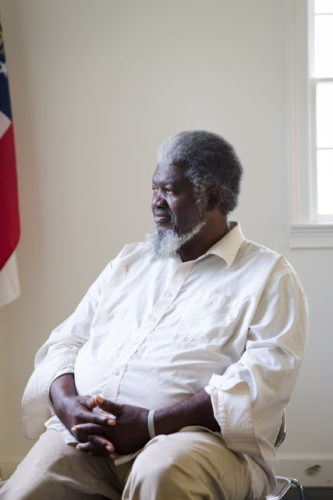
Marion Warren, a Sparta elections official who documented the purges and raised an alarm with voting-rights advocates. Credit Kevin D. Liles for The New York Times
“A lot of those people that was challenged probably didn’t vote, even though they weren’t proven to be wrong,” said Marion Warren, a Sparta elections official who documented the purges and raised an alarm with voting-rights advocates. “People just do not understand why a sheriff is coming to their house to bring them a subpoena, especially if they haven’t committed any crime.”
The county attorney, Barry A. Fleming, a Republican state representative, said in an interview that the elections board was only trying to restore order to an electoral process tainted earlier by corruption and incompetence. The lawsuit is overblown, he suggested, because only a fraction of the targeted voters were ultimately scratched from the rolls.
“The allegations that people were denied the right to vote are the opposite of the truth,” he said. “This is probably more about politics and power than race.”
But the purge of Sparta voters is precisely the sort of electoral maneuver that once would have needed Justice Department approval before it could be put in effect. In Georgia and all or part of 14 other states, the 1965 Voting Rights Act required jurisdictions with histories of voter discrimination to receive so-called preclearance before changing the way voter registration and elections were conducted.
Three years ago, the Supreme Court declared the preclearance mandate unconstitutional, saying the blatant discrimination it was meant to prevent was largely a thing of the past.
But since the Supreme Court’s 5-to-4 ruling in the voting-rights case, Shelby County v. Holder, critics argue, the blatant efforts to keep minorities from voting have been supplanted by a blizzard of more subtle changes. Most conspicuous have been state efforts like voter ID laws or cutbacks in early voting periods, which critics say disproportionately affect minorities and the poor. Less apparent, but often just as contentious, have been numerous voting changes enacted in counties and towns across the South and elsewhere around the country.
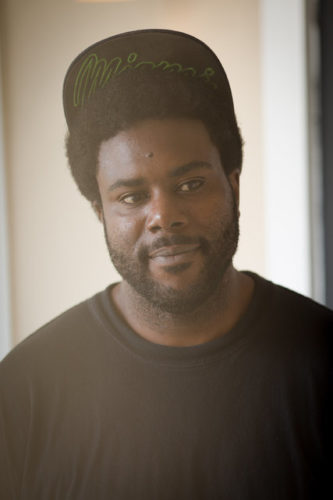
Martee Flournoy, 32, was one of many black Sparta, Ga., residents whose voter registration was challenged last year. Credit Kevin D. Liles for The New York Times
They appear as Republican legislatures and election officials in the South and elsewhere have imposed statewide restrictions on voting that could depress turnout by minorities and other Democrat-leaning groups in a crucial presidential election year. Georgia and North Carolina, two states whose campaigns against so-called voter fraud have been cast by critics as aimed at black voters, could both be contested states in autumn’s presidential election.
Kristen Clarke, the president of the Lawyers’ Committee for Civil Rights Under Law, a leading voting-rights advocacy group, said that before the Supreme Court’s Shelby County ruling, discriminatory laws and procedures had been blocked by the preclearance provisions.
Now, she said, “We’re seeing widespread proliferation of these laws. And we are left only with the ability to mount slow, costly case-by-case challenges” to their legality....
The local voting changes have often gone unnoticed and unchallenged. A June survey by the NAACP Legal Defense and Educational Fund found that governments in six former preclearance states have closed registration or polling places, making it harder for minorities to vote. Local jurisdictions in six more redrew districts or changed election rules in ways that diluted minorities’ votes.....
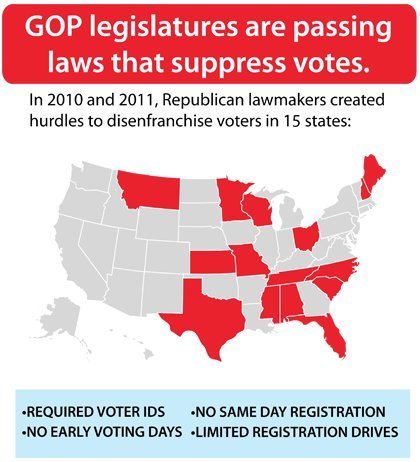 But perhaps none of the battles is more striking than the one in Hancock County, about 100 miles southeast of Atlanta, where three in four of the roughly 10,000 residents are black. The racial divide here is deep and prolonged; the white mayor of the county seat, Sparta, made headlines in 1970 after responding to black citizens’ school-desegregation protests by equipping the town’s six-member police force with submachine guns.
But perhaps none of the battles is more striking than the one in Hancock County, about 100 miles southeast of Atlanta, where three in four of the roughly 10,000 residents are black. The racial divide here is deep and prolonged; the white mayor of the county seat, Sparta, made headlines in 1970 after responding to black citizens’ school-desegregation protests by equipping the town’s six-member police force with submachine guns.
By the 1990s, the Justice Department had invoked its preclearance authority to block measures that it said would weaken minority representation on the Sparta City Council, but political control of the county was frequently split. By last year, black politicians ran Sparta, a white majority controlled the Hancock County commission, and a furious contest was underway between black and white slates to control the next Sparta administration.
The five-member Hancock County Board of Elections and Registration was controlled by three white members — the chairwoman, appointed by a local judge, and two members appointed by the Hancock County Republican Committee — one of whom, curiously, is a Democrat. According to documents filed in a federal lawsuit in nearby Macon, the board began taking steps last August that seemed destined to tilt the playing field to the white slate’s advantage.
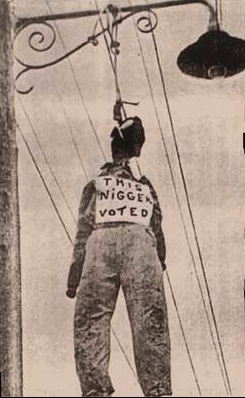
During Jim Crow, blacks who voted – or tried to vote – were likely to be intimidated, beaten, or worse.
The board first proposed to close all but one of the county’s 10 polling places, a move the N.A.A.C.P. and other minority advocates argued would disenfranchise rural blacks who could not travel long distances to vote. Board members eventually chose to eliminate just one predominantly black precinct. But around the same time, they began to winnow the county’s roll of registered voters, ordering an aide to compare the registrants’ stated addresses with those on their driver’s licenses to spot voters who had moved after registering to vote.
By October, a month before the city election, the board and a private citizen who appears to have worked with its white members had challenged the legality of 187 registered voters in Sparta. The board removed 53 of them, virtually all African-Americans — roughly one of every 20 voters. As a “courtesy,” court papers state, county sheriff’s deputies served summonses on the targeted voters, commanding them to defend themselves at election board meetings.
Some did, and were restored to the rolls. Others reacted differently to a police officer’s knock on their door.
“A lot of voters are actually calling to say they no longer wish to be on the list, so now we have people coming off the list who no longer want to vote,” Tiffany Medlock, the elections supervisor for the Hancock County elections board, told a Macon television reporter in late September. “It’ll probably affect the City of Sparta’s election in a major way....”
Full article here.
More Breaking News here.
Comments Are Welcome
Note: We moderate submissions in order to create a space for meaningful dialogue, a space where museum visitors – adults and youth –– can exchange informed, thoughtful, and relevant comments that add value to our exhibits.
Racial slurs, personal attacks, obscenity, profanity, and SHOUTING do not meet the above standard. Such comments are posted in the exhibit Hateful Speech. Commercial promotions, impersonations, and incoherent comments likewise fail to meet our goals, so will not be posted. Submissions longer than 120 words will be shortened.
See our full Comments Policy here.